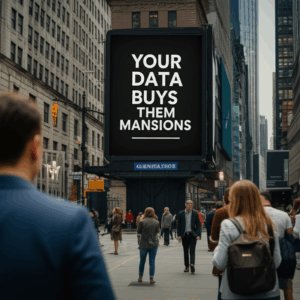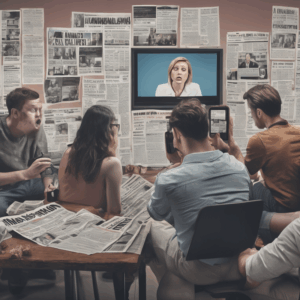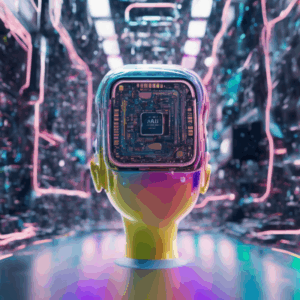
Bystanders Horrified by Slightly-Too-Honest AI Billboard 😳📺
On a busy metropolitan street, amidst the usual cacophony of honking cars and bustling pedestrians, an unusual billboard has caused quite the stir. It’s not the digital lights or animated visuals that have captured attention but its blunt, unapologetic honesty. Described as a “soul-crushing truth-teller,” the billboard, powered by AI, showcased statements like, “You’ll forget this ad five seconds after seeing it,” leaving many bystanders agape, grappling with the all-too-accurate reflection of their consumerist tendencies. 🛍️
In a world swirling with curated perfection, the stark reality of an AI billboard professing such brutal truths somehow manages to convey human complexity. It conjures an ironic twist of fate, where technology, designed to sell us countless products and lifestyles, possesses a clearer sense of our buying habits than we do ourselves. Just like a hollow man wearing a perfectly tailored suit, the billboard exposes the emotional emptiness often accompanying relentless consumption.
The Irony of Honesty
Ponder this: in an era dominantly embellished by marketing spin and curated personas, is there beauty in a digital entity that chooses truth over hyperbole? The contrast is striking. A billboard engineered to motivate purchases instead conveys an unsettling familiarity with our behavior—a paradox that elicits an involuntary cringe. Passersby found themselves not just laughing at the irony but confronting their subconscious complicity in a culture fixated on immediate gratification. It’s as if the billboard holds up a mirror reflecting, “You’re not even sure if you want this,” capturing sentiments shared by many. 🤔
The Ripple Effect
While many viewers initially recoiled, a ripple effect formed within social media circles, where hashtags like #AIRealityCheck trended overnight. People took to their screens, sharing grim screenshots mixed with amusement and outrage—highlighting the deep divide in our relationship with technology. AI, often hailed as a revolutionary force for good, dashed into the scene with a truth that was simultaneously enlightening and discomforting. Could it be that this billboard cuts deeper than all the marketing tactics combined?
To immerse in the complexities provoked by such stark truths is like standing at the edge of an abyss—eager yet frightened. The phenomenon raises significant questions about ethics in advertising and the role of AI in today’s consumer landscape. Can brutal honesty redefine marketing, pushing brands to be more transparent while cultivating a stronger brand-customer relationship? Clarity in communication, it turns out, might trump the glimmer of exaggeration. 💡
AI: The New Conscience of Marketing
Is it possible that the very technology intended to capture our attention is also teaching us about ourselves? The billboard’s success lies not in its capacity to create a desire for objects but in its uncanny ability to evoke self-reflection—a rare quality in today’s advertising environment. This draws a striking antithesis between the role of traditional marketing, which often constructs idealized narratives, versus AI’s genuine candor.
By allowing machines to embrace our flaws, we may discover a new paradigm where brands become less like ethereal deities and more like relatable companions. After all, who among us doesn’t cringe at the thought of forgetting that enticing ad mere moments after watching it? Beyond mere amusement, this AI billboard taps into a deep vein, posing questions about the nature of desire and fulfillment. Are we consistently searching for something more? 🔍
The Future of Truth in Advertising
As society contemplates the implications of a billboard that challenges our perceptions, one can’t help but speculate on the future of marketing. Could we see more brands adopting this raw approach, invoking authentic connections and a deeper understanding of the consumer psyche? It’s a possibility even the most sophisticated marketers may find worthy of their attention. 📈
Yet, within this wave of honest marketing, we must consider a crucial question: can we truly handle the truth? The haunting ring of the billboard’s statements lingers—the more we recognize our habitual buying patterns, the more we confront the uncomfortable reality of our desires. While we engage in this strange dance with AI, grappling with the ethics of technology and capitalism, we may yet find ourselves hoping for a version of marketing that respects our intelligence, entices authentic engagement, and leads us to choose wisely. 🧐






